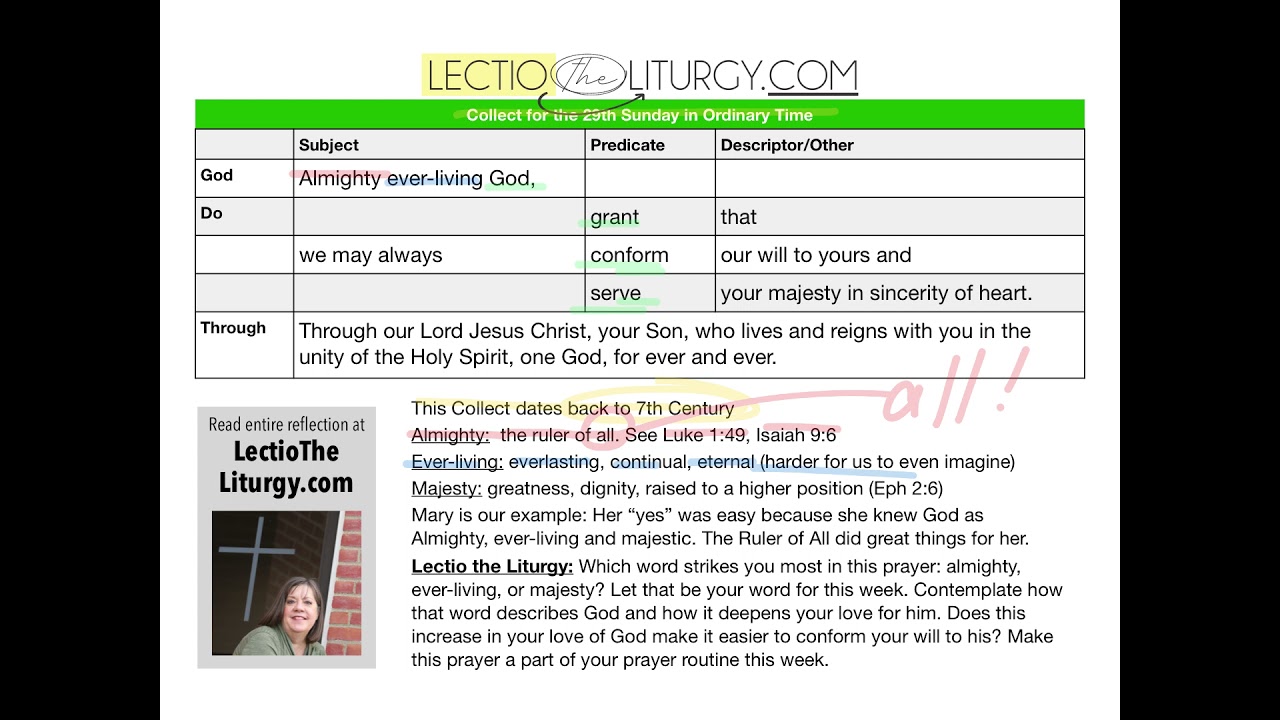Collect 29th Sunday in Ordinary Time
The Collect for the 29th Sunday in Ordinary Time dates back to the 7th Century. In the Gelasian Sacramentary, this prayer was used on a Sunday late in Easter Time. I find it to be a good prayer for every day.
Almighty ever-living God, grant that we may always conform our will to yours and serve your majesty in sincerity of heart. Through our Lord Jesus Christ, your Son, who lives and reigns with you in the unity of the Holy Spirit, God, for ever and ever.
When is the last time you thought about God? Not what God might want, not about sin, but you just thought about who God is and the attributes of God? If it’s been a while, here’s your chance! This prayer gives us three words that tell us a lot about God.
1) Almighty: Almighty is defined as the one who has power. The definition in Vine’s Dictionary reads, “the ruler of all.” I love that definition and here’s why: Because “all” means all. As the Almighty, God is the ruler of all. I also love how that definition adds to Mary’s Magnificat in Luke 1:49 “for the Mighty One [the ruler of all] has done great things for me.”
In the Apostles’ Creed we proclaim, “I believe in God, the Father Almighty.” Father Almighty is together, there’s no comma that separates them.
Isaiah’s prophecy in chapter 9:6 reads, “His name shall be called Wonderful, Counselor, Mighty God…” and it created a stir because no earthly ruler was ever called almighty, nor were they the ruler of all.
2) Ever-living: In the Latin form of the prayer, this word also means everlasting, continual, or eternal. It’s hard for us to grasp what ever-living is, our lives are filled with stops and starts. People we love pass away. Summer ends, autumn begins. Nothing stays the same. However, there is an exception: God is our Father who lives forever. For ever he has and will love his people.
3) Majesty: Vine’s Dictionary teaches that majesty is from the word “megas” meaning great. Majesty is used of God the Father, signifying His greatness and dignity. God’s majesty is easy to see at Glacier National Park and in sunsets. God’s majesty is also seen in the person next to you at mass and God’s majesty is also in you.
Majesty is also defined as elevated to a higher position. In Ephesians 2:6, Paul writes that God has “raised us up with him and seated us with him in the heavenly places in Christ Jesus.” (ESV) God has given his majesty to us, it should make us humble and grateful.
I’ve been meditating on this prayer for over a week. I’ve been pondering the Ruler, the ever-living, loving Father, and the greatness and dignity of God. It seems to be easy for us to not always remember the greatness of God, but Mary didn’t forget.
Why did Mary’s “yes” to Gabriel seem to come so easy for her? What made Mary so quick to put her own plans aside and to conform her will to God’s? Because she knew God. She knew that the Almighty had done great things for her and no matter what the future held, her Almighty would be with her. She knew that no matter what she desired, God’s will for her would always be greater. May we find the courage to allow God to grant that our will be conformed to his.
Lectio the Liturgy: Which word strikes you most in this prayer: almighty, ever-living, or majesty? Let that be your word for this week. Contemplate how that word describes God and how it deepens your love for him. Does this increase in your love of God make it easier to conform your will to his? Make this Collect a part of your prayer routine this week.
Thanks for praying with me,
Julie
